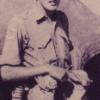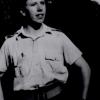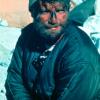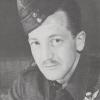Neville Ashley was born in Hale-Barnes, Cheshire, on 26 June 1913. He led a typical rural life in the years between the two World Wars, working for various farms and small shops in the area of Hale and Hale-Barnes. On 5 May 1930, at the age of 16, Neville enlisted in the Territorial Army and was assigned to the 7th Battalion of the Cheshire Regiment, where he achieved the rank of Corporal before being discharged in May 1934. Thereafter he married the sweet heart of his life, Isabella Cottingham of Hale, and before the outbreak of hostilities in 1939 was father to two daughters, Margaret and Sheila.
On 2 February 1939, Ashley rejoined his old battalion, who were later a part of the British Expeditionary Force when the German attack commenced in May 1940. Ashley was involved in several engagements in Belgium and France during the retreat to Dunkirk, and it was from the nearby beaches at La Panne that he and the remainder of his company were evacuated aboard the Dutch ship, Horst, which unloaded its human cargo at Margate.
Ashley was discharged from service for a second time, but in January 1943 he reenlisted in the Army Air Corps. He trained at Ringway and Tatton Park, which was an easy walk to his home in Hale, and from here, as a Corporal, he was assigned to A Company of the 2nd Battalion, who were then stationed in North Africa.
In July 1943 the 1st Para Brigade was charged with the capture of Primosole Bridge, in Sicily; Ashley's stick being amongst the few that were dropped reasonably on target, and positioned in the hills to the south of the bridge, A Company bore the brunt of the German counter attacks. In the early morning of the 14th July, a heavy attack was underway and Ashley, manning an exposed Bren gun position, cut down an advancing German machinegun section. Later in the day, whilst under heavy sniper fire, he shot and seriously wounded a German parachutist. The surrounding wheat fields were ablaze and the helpless German was in danger of being burned alive, and so with an utter disregard for his own safety Ashley abandoned his position and ran to his aid, and then carried him to the battalion medical station. For this action, Ashley was later awarded the Military Medal by King George VI. His citation reads:
'On the 14th July 1943 this soldier manned a Bren Gun in a most exposed position, South of Catania in Sicily, in order to allow his section to dig in, during this period he was continually being sniped. On one occasion he located an enemy Machine Gun post taking up a position from which to engage his comrades. With complete disregard for personal safety he moved his Gun wall forward and destroyed the crew. Later having shot a German soldier at short range he went out and brought him into the R.A.P. as he was in danger of being burned alive.'
Returning to England, Ashley was promoted to Sergeant and given command of No 2 Platoon's 1 Section. Under the command of the indomitable Lieutenant Jack Grayburn, the Platoon led the 2nd Battalion's advance to Arnhem bridge on Sunday 17th, rapidly cutting their way through numerous encounters with light opposition as they went. Upon reaching the bridge they attempted to capture the southern end during the night, but were driven back by severe enemy fire. Over the following three days Ashley's story was, like so many others, one of steadfast defence and counterattack.
On Wednesday 20 he was dug into the ramp of the bridge, near the steps which led down to street level, when he was shot through the hip by a sniper's bullet. Out of ammunition and under heavy fire from all sides Sergeant Ashley led the remaining five men of his Section, accompanied by one German prisoner, down the side of the ramp and into a chamber beneath and built into the bridge. A Tiger Tank arrived and at point blank range proceeded to fire several shells at the door behind which the paratroopers had sought shelter. German engineers equipped with flame-throwers closed in but first threw in smoke grenades to flush out the now blinded men. The prisoner that the Section held offered to go outside offer their surrender if the German troops would hold their fire. This was accepted and the six paratroopers, all of whom now carried wounds, emerged into the open where they were disarmed and told to rest on the grassy side of the ramp. Here the Germans treated their wounds and handed a small barrel of beer around to quench their thirst.
Like a great many others, Sergeant Ashley was sent to the sorting camp at Stalag XIIA, Limburg. In his first letter home he wrote: 'Have been taken prisoner in Germany. Am in good health. Will be moving to another camp in few days. Please don't write till I give new address.' This other camp was Stalag XVIIIC (317), at Markt Pongau, in Austria, from where he was liberated by American soldiers shortly before the end of the War.
On 15 October 1944 he wrote the following home 'Dear Mum + Dad, there isn't room to write much on here, so I will have to be satisfied with telling you that I am going on O.K. We are being treated quite well and have not much to worry about, hope it will be over soon. Give my love to all at home, hope you are both keeping well. Love from Nev.'
After returning to England, Neville Ashley was discharged from service. Two more children, Jenny and Graham were born to the Ashley family. Entering teachers college, from which he graduated, he worked as a handicraft teacher at Winton Secondary School until he retired. In his later years, he was the branch secretary for The Parachute Regimental Association, Knutsford Branch. Very active in veterans affairs, he maintained close contact with his old commanding officer, then Major-General John Frost, and many others.
After a short illness, Neville Ashley MM passed away on the 17 March 1993, greatly missed by all.
Thanks to Robert and Jenny Shaw, Neville Ashley's daughter, for this biography.
Courtesy of Mark Hickman and the Pegasus Archive
Read More




Latest Comments
There are currently no comments for this content.
Add Comment
In order to add comments you must be registered with ParaData.
If you are currently a ParaData member please login.
If you are not currently a ParaData member but wish to get involved please register.